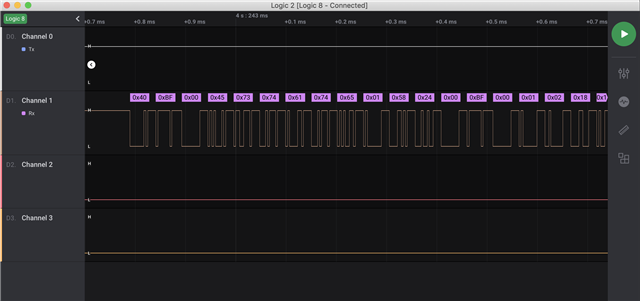I've configured UART2 on the nRF9160 to connect to a nRF52840. The nRF52840 generates a payload and sends it over to the nRF91. The payload size during testing was 65 bytes. The problem with all of this? Using the CONFIG_UART_INTERRUPT_DRIVEN code, the UART peripheral is able to receive the first 8 bytes correctly. Then there's an additional 4 bytes of bogus data followed by the start of the next payload. (Same first 8 bytes) I'm running UART @ 250k BAUD.

Everything matches up with the transmitting device signal wise.
I'm looking into the ASYNC API to see if that makes a difference. It's a bit hairy though and overkill for this application. (Previous implementation was on a nRF52 buffering each byte as it came in via interrupt)
I'm initializing like this:
static int uart_init(void)
{
uart = device_get_binding(DT_LABEL(DT_NODELABEL(uart2)));
if (!uart)
{
LOG_ERR("UART binding failed");
return -ENXIO;
}
/* Set the data */
uart_data.len = 0;
/* Set up callback for serial event */
uart_irq_callback_set(uart, uart_interrupt_handler);
/* Enable the irq */
uart_irq_rx_enable(uart);
/* No errors */
return 0;
}
This is what the callback looks like.
static void uart_interrupt_handler(struct device *dev)
{
uart_irq_update(dev);
/* Check if there's serial data. */
while (uart_irq_rx_ready(dev))
{
int data_length;
// Read the data
data_length = uart_fifo_read(dev, &uart_data.buffer[uart_data.len],
UART_BUF_SIZE - uart_data.len);
printk("%x ", uart_data.buffer[uart_data.len]);
/* First byte is how much data */
if (uart_data.len == 0)
{
chunk_size = uart_data.buffer[0];
printk("start chunk size = %d\n", chunk_size);
}
/* Increment data amount */
uart_data.len += data_length;
/* Decode the data if chunk_size == uart_data. */
if (uart_data.len >= chunk_size + 1)
{
/* Do stuff */
uart_data.len = 0;
}
}
}
Here's the overlay
/*
* Copyright (c) 2020 Circuit Dojo LLC
*
* SPDX-License-Identifier: Apache-2.0
*/
&uart2 {
compatible = "nordic,nrf-uarte";
current-speed = <250000>;
status = "okay";
tx-pin = <24>;
rx-pin = <23>;
rts-pin = <29>;
cts-pin = <30>;
};
It seems like there may be a potential error condition or that the interrupt is not getting called fast enough to process the data?
Any suggestions?
Thanks!
